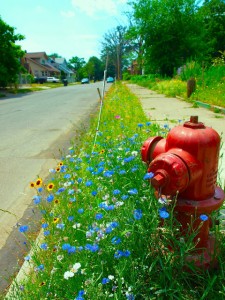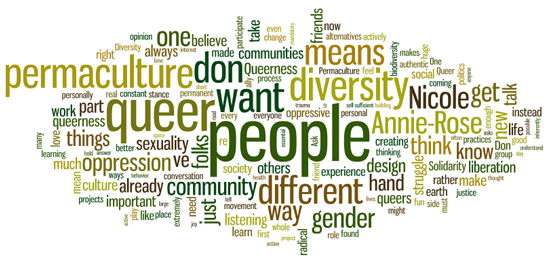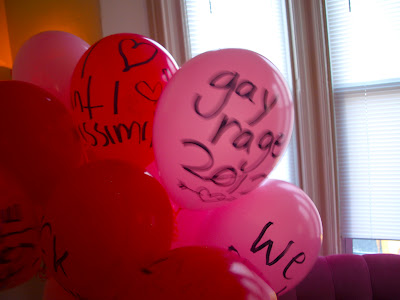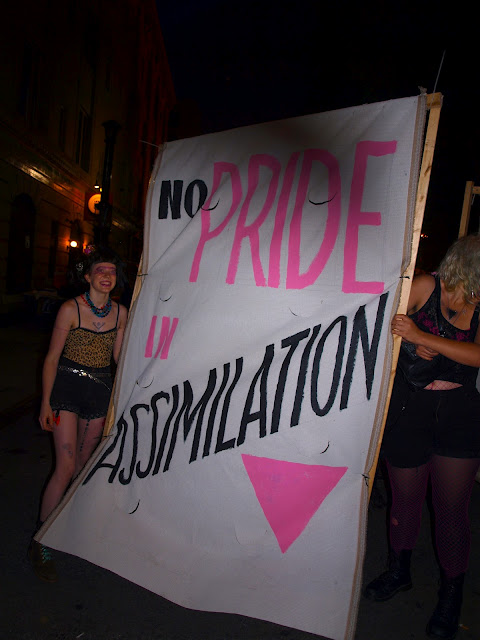Permanent Culture Now is proud to host a guest post from Nicole from Wild Heart Permaculture.
Gender, sexuality and design
This article is a conversation between queer permaculture practitioners and community organisers, Nicole Vosper and Annie-Rose London, communicating across continents about gender, sexuality and design.
Nicole: One of the key principles of permaculture is ‘Use & Value Diversity’, in terms of how we design our communities this may also apply to gender & sexuality. How do you think people can design for diversity?
 Annie-Rose: In order to design for diversity, we first need to acknowledge one fundamental assumption – that we’re not already diverse. I think people often view social diversity as a passive thing that will just spontaneously happen if we’re not actively homophobic. We live in a power- and access-monoculture. So it ain’t that simple. When we look at fields that are overcome by an invasive grass, it’s clear that we can’t just set up a homestead and wait for biodiversity to kick in. The land is out of balance; it will take active nudging to welcome biodiversity. And you can’t fake it either – simply sowing a few seeds won’t result in a self-sufficient ecosystem. The conditions themselves need to be welcoming, not forceful; space must be made for life, not aggressively prodded into life with chemical fertilizers.
Annie-Rose: In order to design for diversity, we first need to acknowledge one fundamental assumption – that we’re not already diverse. I think people often view social diversity as a passive thing that will just spontaneously happen if we’re not actively homophobic. We live in a power- and access-monoculture. So it ain’t that simple. When we look at fields that are overcome by an invasive grass, it’s clear that we can’t just set up a homestead and wait for biodiversity to kick in. The land is out of balance; it will take active nudging to welcome biodiversity. And you can’t fake it either – simply sowing a few seeds won’t result in a self-sufficient ecosystem. The conditions themselves need to be welcoming, not forceful; space must be made for life, not aggressively prodded into life with chemical fertilizers.
Increasing Diversity
Increasing diversity in our human communities doesn’t mean simply opening our doors and shouting loudly “Hey! We want diversity! Come on in!” We need to acknowledge that we’re coming from an extremely unhealthy society, one in which things are coming from a base-line of non-balance. I’ve been in a lot of places that think they’ve accomplished their work of increasing human diversity because they said so in their mission statement. If you want participation from anyone besides those already most empowered by society, i.e. heterosexual cis-gendered white males, here are the tools I believe are most important:
Decide why. Be honest. It’s important that you aren’t seeking diversity to be politically correct, to look good, or to make yourself feel better. Figure out why you, you personally, want to make this effort.
Make friends. We can deconstruct participation and diversity and outreach in many ways, but at the end of the day, people want to be with friends, they want to feel loved. Don’t plot all the time; actually make friends with people. And not just to manipulate them into joining your project, but to learn from each other, to have fun, to, you know, make a friend. This isn’t magic.
Listen. The stance of being an ally must be one of listening. We must engage with people of all kinds who are different from us and actively listen to their goals, their needs, and their inspirations. We can’t tell queers how they should want to participate. I cannot stress enough how important it is to have a stance of listening rather than one of telling. Remember that analogy to biodiversity (create nurturing environments that are conducive to growth rather than forcing growth)!
Lay aside your ego. This is an inevitable challenge that goes hand in hand with listening, especially when we get to the doing part. Listening to people who have different experiences of life and of oppression means that you will have to accept that someone else’s priorities are different from your own. In order to be an ally you may have to revise your own priorities. You will have to make the radical mental leap that other people’s lives are actually different from yours. For example, say you don’t get why it’s important to have mandatory break-time because in your opinion, people can take a break whenever they want. If someone is telling you that they want a mandatory break-time, they might have valid reasons that you don’t understand. Try to dig in and understand and be willing to try out ideas that don’t come easily to you. Also, you’re gonna get called out for oppressive behavior (or called in, as I’ll explain later.) Take this personally, cause it is within your personal power to change. But don’t take it as a negative reflection on who you are. We are all healing from a messed up society that has made us think in harmful ways. People are calling you out because you matter to them, they consider you an ally and because they think that you are capable of change.
Outreach. Don’t think a tab labeled “Values” on your website is enough to welcome in diversity. Tap in to local queer communities. Ask them if and how they might want to participate. Ask them to teach your community something. Remember, they don’t “get” to learn from you, you all get to learn from each other! Cultivate individual relationships, friendships!, with people rather than sending a flier to an organization’s front desk. Don’t worry whether people join your project or not; this is more about your own learning and personal expansion than it is about a diversity quota.
Solidarity. Solidarity is understanding that we all have different identities, experience different systems of oppression and require different pathways to liberation. It is not an attempt to homogenize. We can hold these differences and stand side by side, knowing that all oppression is linked and that dismantling oppression benefits everyone. Solidarity means action, not talk. It means coming to events that your allies hold AND inviting your friends. It means educating yourself and others about their issues. It means organizing your own projects that support their efforts and volunteering for things instead of just attending them. Basically, it means “I got your back.”
Please note that all of this is my opinion, derived from what I’ve experienced and heard from others. The best thing you can do is start the conversation from scratch in your own community! What does listening mean to you? Diversity? Solidarity? These are mega buzzwords and warrant more thought.
Nicole: What strength does this diversity bring to our communities?
Annie-Rose: The word “diversity” gets thrown around a lot to the point where I don’t know if I even know it or like it anymore. Right now I am defining it as collective thriving and authentic agency for all beings.
There are two parts to this answer – one is the inherent necessity of social justice as a part of permaculture and earth justice, the other is the extreme goodness that diversity brings.
Liberating the earth and people
I don’t think it makes sense to talk about liberating the earth if we don’t talk about liberating the people on it. To separate ourselves from the earth in that way, to view them as different projects, is to further alienate ourselves from the earth. This is the same kind of thinking that makes it possible to blindly destroy Earth in the first place. Social justice and permaculture go hand in hand for me. There is so much trauma that we all carry from the weight of homophobia, of racism. Even if we are those who benefit from these mindsets, there is a sickness that comes from the hurt and embodied alienation we have from each other. Permaculture is a practice that always looks at the process and incorporates the experience of practitioners into the value of the work itself. So we deserve to work out this trauma and create real alternatives. Otherwise the only people who are going to pick up these practices will be those already empowered to do whatever they want, and that’s a pretty limited movement in my opinion!
Diversity is delicious
Also, diversity is delicious. It is health. It is the joy of learning from those who you thought were different from you but it turns out you can love each other. It is discovering deeper roots, more stories, further richness. It is sustainable because it is interactive, productive, constantly generating new truths and new solutions. These things are not possible with a homogenous group of folks who already agree on everything. Diversity is the beauty of stretching further and staying humble. It is the ecstasy of discovering that you are smaller than ever but more a part of everything than you could have imagined.
Nicole: What does ‘queer’ mean?
Annie-Rose: Queerness asks that we calm our impulse to define. It asks that we engage in the infinite spaces between definition. “Queer” is an orientation towards sexuality and gender, and often reality at large, that allows for multiplicities of truth. There are as many types of queers as there are queers. Queerness is a journey of societal unlearning and an active relearning of our most authentic selves, the self that loves and expresses exactly as it desires. Because our brains are so bound by societal ideas of sexuality and gender, queerness is very much a process, a constant effort to realize our most stunning authentic juiciness. This stuff can get pretty heady, but essentially, queerness means doing what feels good and feeling good about doing it!
Nicole: What does ‘queer’ mean for you personally?
Annie-Rose: My queer identity operates as a constant nudge to sink deeper into my self, to question my choices and to expand further into new possibilities. Queerness is not a pre-formed decision of who I am; it’s an invitation to discover who I am.
Queerness to me means actively listening to myself and to others rather than assuming I already know the answer. It means peeling away the boundaries of love and gender that were artificially drawn around me by dominating forces in the interest of suppressing individuality.
My queerness is political. It is inherently anarchist, anti-authoritarian, anti-capitalist, feminist, and anti-racist. Many essays could be written about why I see all of those connections, but in short, it is a mindset that inherently values all life. I am so totally in the throes of understanding what queerness means to me! A huge part of me just has no idea! It is very much a constant experimentation and reflection. It means that my stance to life is one of always learning.
Nicole: How have you found being queer in relation to the permaculture movement at large?
Annie-Rose: It’s an extremely easy fit for me. Queerness is to sexuality what permaculture is to agriculture. The permaculture way of thinking, of considering process over goals, of stressing experience over ideals; that all breathes out of the same queer core of myself. I have been lucky to work at several queer homesteads where we don’t have to bother saying “queer” without “permaculture”, it always comes out as one word. The radical faeries are a great group to learn about to get a better sense of the roots of this connection. I found permaculture before I found queer politics, and one has been a natural outgrowth of the other.
Nicole: Big question but in short how does society need to be re-designed for real gender & sexual liberation? What role can permaculture designers play?
Annie-Rose: Start loving yourself! Love other people, people who are different from you! Stop being afraid! To me there are many correct answers to this, all of which require that folks believe that they have the right to be happy. I believe that teaching our youth to love themselves is key. I believe queer politics are huge and open up a whole new way of viewing
this liberation. I think that just having people’s needs met; i.e. making sure everyone has access to housing, healthcare, food and education is essential. There’s a tendency to speak in abstract revolutionary metaphors about questions like this, but really there are a ton of queer, gay, lesbian, bi, and trans youth living on the streets right now, sitting in classrooms that teach them self-hate right now, desperately searching for a job because they were fired due to their nonconventional gender right now. There’s plenty of concrete things we take for granted but are real symptoms of oppression.
Get it done
I believe strongly in getting stuff done. Don’t wait for the government to provide all your solutions and don’t hate on your friend because they want to work with the government change policy. Liberation is going to come as a result of millions of people doing millions of different sorts of things. Support each other, celebrate each other, and find what action inspires you.
Eco social design
Eco-social design can play a huge role, because it puts all forms of oppression on the table at once. Hierarchical, colonial, patriarchal, racist, heterosexist, able-ist, capitalistic
mindsets are all linked, all part of the same ability to “other” things that appear different from you and treat them as less valuable. Permaculture is an incredible experiment in creating the alternatives that we want to see, so it is an essential arena for creating social alternatives. If we can be self-sufficient together then we don’t have to rely on the systems of domination that have generated these unbalances in the first place. We can grow a balanced, inclusive culture from the inside.
Nicole: Have you experienced any homophobia within permaculture or land-based projects? How can people stay aware & avoid oppressive practices?
Annie-Rose: Yes. Homophobia is everywhere, friends. It’s even in my own head, although I challenge it and destroy it more and more every day. I’ve been in places where heterosexual couples get celebrated and encouraged while LGBTQ individuals get talked about in whispers. I’ve been asked to represent all queers, always fielding questions about queers in general and made to feel like an outsider. People have assumed who I know, who I sleep with, what I want. I’ve seen LGBTQ men teased for being womanly and weak, which is of course despicable. Homophobia and sexism go hand in hand (e.g. effeminate boys being teased as “girly,” as though that’s an insult).
Healing communities
One way to heal communities is to talk about it openly. Just as you might have a meeting to figure out what crops to plant or how to divide up chores, have a meeting to discuss community agreements and ways that folks want to address oppressive behavior. It is so much easier to address problems when people have already made contingency plans. I use to urge people to develop a culture of calling people out, which means to tell folks when they’ve done something that feels oppressive in the interest of seeing how oppression plays out on the daily and building a better culture.
Recently a friend told about some folks who instead “call people in.” I like that so much more and it’s far more accurate! Call people in who have hurt others.
Regular check ins
Have regular check-ins so that folks know that there’s a pre-established place for them to voice concerns, instead of letting things boil over. Develop some community accountability practices. Educate yourselves and others. Put up signs in bathrooms about gender identity. Ask for people to share their preferred gender pronouns as well as their names during introductions. There are tons of easy-to-read zines available for free online that talk about queerness, oppression, and how to re-educate ourselves. Have reading groups and discussions! One of my favorite farms is a spot outside of Providence, RI where we have big community harvests every sunday and talk about queer politics the whole time. That combination of physical and intellectual stimulation is the bomb-diggity. This can be fun folks!
Nicole: I recently read in a book on (1) Radical Community Organising that “The promise of queer struggles is the exposure to a multiciplity of desires that capital seeks to constrain, and subsequent demands and resistance to centralize pleasure, joy & creativity in everyday lives – all of which are important elements of self-care and community building.” What role can queer struggles play in creating a permanent culture?
Annie-Rose: Queer struggle offers a lens on movement-building in which there is no turning away from one’s experience on the road to liberation. It is the most permanent and sustainable of cultures because it defies the changing whims of social norms and rests solely on the individual and the group to always respond intuitively and uniquely to every new situation on hand. It demands a tolerance for multiplicity, so we can focus on creating love and health instead of wasting our breath trying to convince each other which side of the road to stand on.
Queer struggle
More concretely, queer struggle opens up an extremely useful conversation and way of thinking for anyone interested in permanent culture. You don’t have to identify as queer to participate in queer struggle, just as you don’t have to live full-time on a permaculture commune to know it’s worthwhile. We can all take part in this new world of liberation and discovery. It’s not even that there’s enough room for everyone; each person who joins the struggle invents whole new previously-undiscovered space. By engaging in queer struggle we realize our most gorgeous selves. We further incorporate the experiences of the participant into the practice of permaculture. It makes the “doing” of this movement way more succulent, way more fun, way more breathtakingly personal and for all those reasons way more likely to keep people engaged.
Designing for diversity helps create healthy ecosystems and so recognising & designing for sexual diversity in human communities is fundamental to building a permanent culture.
Links & Resources
1. Benjamin Shepard (2010), ‘DIY Politics and Queer Activism’ in Team Colours Collective, Uses of a whirlwind. Movement, movements and contemporary radical currents in the United States, Oakland, AK Press
2. To follow the journey of Annie-Rose London: thereisonlymake.tumblr.com, newtacticalltactics.blogspot.com
3. For more links between radical community organising and permaculture: www.wildheartpermaculture.co.uk





Really interesting blog… I was wandering if you feel that ecofeminism comes into this? Reading about this it seems the same, emphasis on diversity and so on… But i might be wrong!